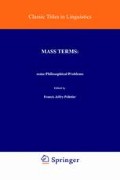Abstract
Metaphysical problems often concern the relation between various types of entities or putative entities. Philosophers at least since Aristotle have puzzled over the relation between particulars and universals, substances and things, movements and actions. Debate over the first of these issues still continues, but I think it is fair to say that there was an increase in clarity when, around the turn of the century, the notion of a set was made clearer and more explicit. For the purposes of logic, at least, the use of a set of objects as the analogue of a universal has been quite fruitful. Interpreting a predicate by means of a set of ordered n-tuples has provided a precise characterization of the semantics of the language which has led to interesting metatheoretical and philosophical consequences. There are still some problems which are not resolved by this approach. For example, it seems intuitively plausible that there could be two distinct universals with the same instances. Nevertheless, the approach at least gives an unproblematic theory of truth for sentences involving only particulars and universals. The issue about distinct universals with the same instances is a disputed one and in any case the set theoretic view enables one to give a sharp statement of the issue in dispute.
I am indebted to Brian Chellas, Kathleen Cook and David Rosenthal for helpful comments on an earlier version of this paper which was read at the APA Eastern Division meetings in December, 1973.
Access this chapter
Tax calculation will be finalised at checkout
Purchases are for personal use only
Preview
Unable to display preview. Download preview PDF.
Notes
Comments on Moravcsik’, in K. J. J. Hintikka, J. M. E. Moravcsik, and P. C. Suppes (eds.), Approaches to Natural Language, D. Reidel, Dordrecht and Boston, 1973.
For a thorough discussion of the cost of alternative theories, see T. Burge, `Mass Terms, Count Nouns and Change’, this volume, pp. 199–218.
I am indebted to Stephen Schiffer for insisting on the importance of this point.
There are some anomalous mass terms in English which apparently must be treated as higher than second order. Terms such as `furniture’, `jewelry’ and so on have as minimal units items which are already individuated by means of count nouns such as `chair’ and `necklace’. Thus if we identify the furniture in a room with the set of chairs, tables, etcetera, then we will find that `furniture’ is a fourth order predicate. I doubt that such nouns are of any theoretical interest.
Quantities’, Philosophical Review 79 (1970), 25–42; see also K. C. Cook, `On the Usefulness of Quantities’, this volume, pp. 121–135.
I find Cartwright’s arguments (p. 40, op. cit.) that a quantity cannot be a set of elements puzzling The argument seems to show that we may have to make a rather arbitrary decision as to exactly which set, but this does not mean we could not make such a choice. Indeed her argument seems to show that ordinary intuitions are sufficiently vague that no harm is done by such a choice. For a more extended discussion of this issue see Henry Laycock, `Some Questions of Ontology’, Philosophical Review 81 (1972), 3–42.
Author information
Authors and Affiliations
Editor information
Editors and Affiliations
Rights and permissions
Copyright information
© 1975 Springer Science+Business Media Dordrecht
About this chapter
Cite this chapter
Grandy, R.E. (1975). Stuff and Things. In: Pelletier, F.J. (eds) Mass Terms: Some Philosophical Problems. Synthese Language Library, vol 6. Springer, Dordrecht. https://doi.org/10.1007/978-1-4020-4110-5_15
Download citation
DOI: https://doi.org/10.1007/978-1-4020-4110-5_15
Publisher Name: Springer, Dordrecht
Print ISBN: 978-1-4020-3265-3
Online ISBN: 978-1-4020-4110-5
eBook Packages: Springer Book Archive

